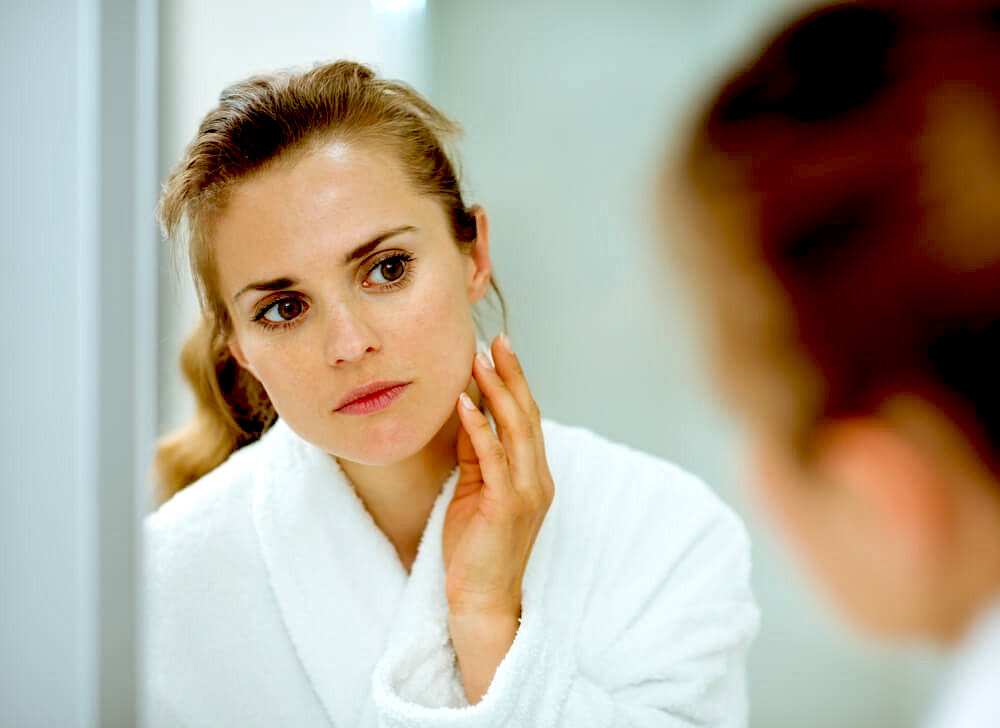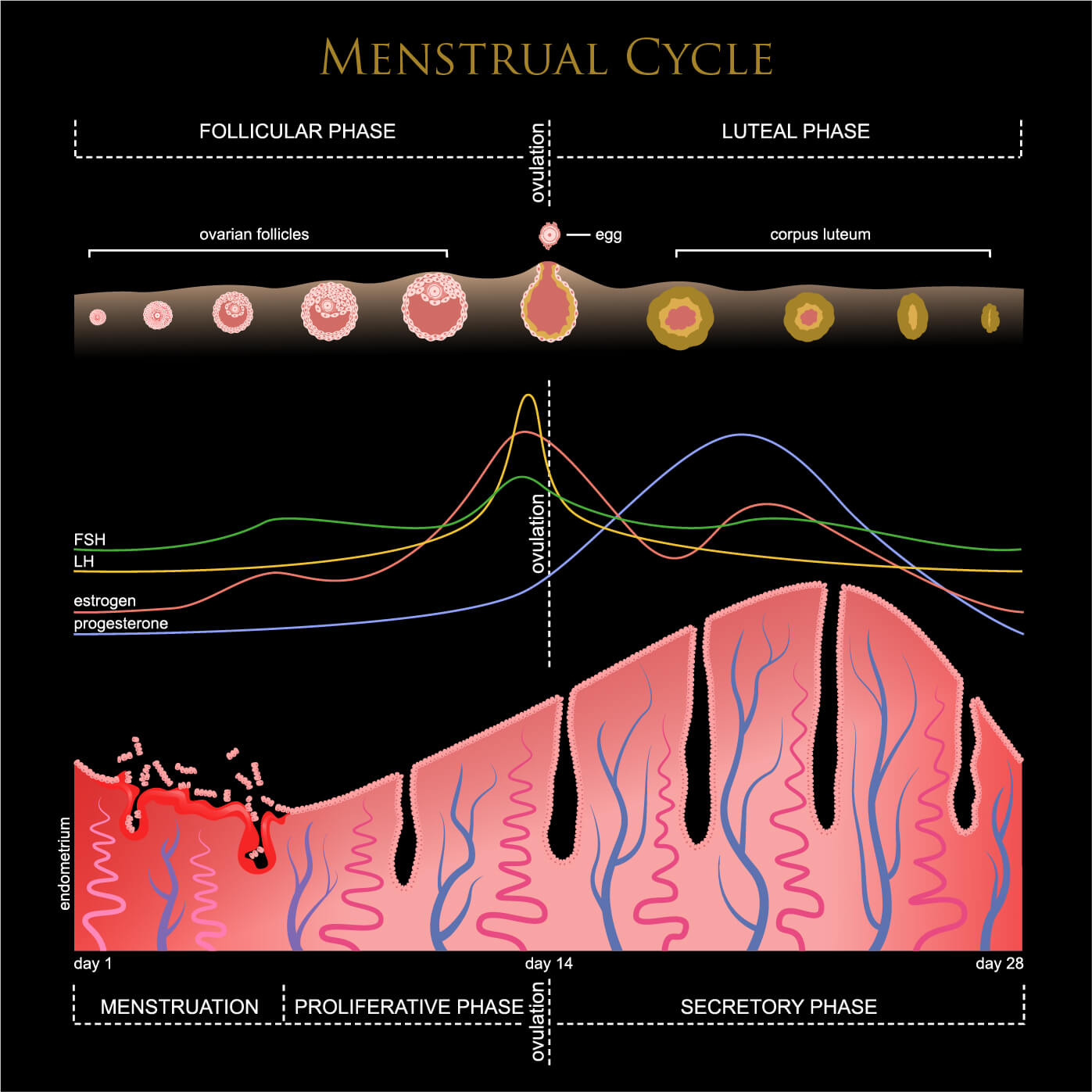The Real Connection Between Hormones and Skin Cell Structure

Your skin is your body’s largest organ, and accounts for around 15% of your total body weight. When it comes to the structure of each individual skin cell, there are a number of factors that play into this, one of which is your hormones.
What Exactly Are Hormones?
Hormones are basically chemical messengers that are produced by the endocrine glands. These then travel through the bloodstream and into tissues and organs, regulating their behaviour and physiology.
Essentially, hormones carry messages between your cells and your organs, and affect just about every single bodily function, from growth to mood to digestion.
Want to get more specific?
There are actually several different types of hormones, and each cell within your body will have a receptor for a specific type of hormone. Once the receptor recognizes that a hormone is present, it conveys this message to the nucleus of the cell, which then puts this message into action.
If hormones are not able to bond to a receptor in a cell, then it will not have any effect, no matter how much of that hormone may be in your bloodstream. However, if certain cells have more receptors than others, then this area will be more sensitive to the effects of that particular hormone.
Types of Hormones
Your body produces such a wide range of hormones, and each one will have a different function.
These are a few that can have a direct impact on your skin, as well as its cell structure:
- Progesterone – affects female sexual characteristics, and is important during pregnancy
- Estrogen – key for the development of female sexual characteristics
- Androgen – a steroid hormone that is essential for developing male characteristics
There are many more hormones that your body produces, with your endocrine system releasing over 20 different types of hormones into your bloodstream at any one time, with each one then travelling off to the part of the body that they wre designed for.
When it comes to the hormones designed for the skin, each one will affect your skin cell structure in a different way…
Progesterone
While the exact way in which progesterone affects skin cell structure is relatively unknown, studies have shown that it can interfere with the way in which cell receptors recognize estrogen.
What does this mean?
It means that, even though you may have the right amount of estrogen in your body, having an imbalance of progesterone will mean that your cells will not be able to receive messages from this hormone.
Estrogen
Estrogen is a hormone that is so influential when it comes to the skin, especially for females.
To begin with, estrogen regulates the size, as well as the function, of the sebaceous glands in the skin, which are responsible for producing oil. Since women have more estrogen than men, this means that female skin will have smaller pores, and be drier, than male skin.
Here are a few of the other ways in which estrogen affects the skin:
- Increases cell turnover, which is the rate at which your skin sheds its dead skin cells and produces new ones
- Keeps the skin’s natural oils thinner and less fatty
- Slows hair growth
- Reduces the size of sebaceous glands, and slows down their production rate
There is one more extremely important role that estrogen has when it comes to the skin…
Estrogen is key when it comes to the production of hyaluronic acid.
Heard this term before, but not sure what it means?
Hyaluronic acid is what enables your skin to hold on to moisture. Thanks to this, your skin is able to prevent itself from stretching, while staying smooth, soft and moist. It is also vital when it comes to your skin cell structure, as it forms a significant part of the outer matrix of your cells.
Androgen
Androgen is a hormone that is found at a much higher concentration in men than in women, and is largely responsible for the differences in male and female skin cell structure.
Here are a few of the effects that androgens have on the skin:
- Increases cell turnover
- Increases hair growth
- Increases collagen production
- Increases the size of sebaceous glands, and speeds up their production rate
As you can see, each hormone is important for different functions within your body.
When these hormones are all in balance, your body will thrive. However, there are a number of different factors that can cause an imbalance in your hormones, which would then have an effect on your skin, as well as its cell structure.
Puberty
Your body’s first major hormonal changes take place during puberty, and this is the time during which androgens become dominant.
What does this mean for your skin?
Well, all of the androgen means that your skin follicle glands become larger, and therefore produce more oil. This excess oil, combined with inflammation, clogs up the pores and results in teenage acne.
The Menstrual Cycle
You may have noticed that your skin undergoes certain changes at similar times of each month, and this is due to your menstrual cycle.
As the month progresses, your hormones change:
- The first half of the menstrual cycle – estrogen is dominant and heavily limits oil production
- After ovulating – an increasing amount of progesterone is produced, making this the dominant hormone. While the exact effect of this is unknown, this is the time during which estrogen receptors are interfered with, resulting in thicker skin oil and premenstrual breakouts

Pregnancy
Pregnancy affects women in so many different ways, and while some may find that their skin looks better than ever, others may be overcome with pimples and a range of skin problems.
Have you ever wondered why this is?
The reason is all down to hormones.
During pregnancy, progesterone becomes the dominant hormone, with the placenta producing up to 20 times the amount of progesterone than it usually does.
As mentioned above, the exact effects of progesterone are unknown, but this, coupled with the low levels of androgen that are experienced during pregnancy, could be why the effects that pregnancy has on the skin are so varied.
In addition to all of this, many pregnant women also experience a dark, thin line that runs from their naval to their groin. Often referred to as the mask of pregnancy, the official name for this is linear nigra.
Wondering what causes this?
This is due to the overproduction of MSH, a hormone that stimulates melanocytes, which give skin cells their color.
Menopause
Menopause is the final major hormonal change that your body will go through, but this occurs gradually, often over a period of ten years.
There are a number of different hormonal changes that happen during this time, and these all have an effect on the skin:
- Production of progesterone stops
- Testosterone production continues, leading to facial hair growth and acne
- Estrogen production significantly slows down
The last point, about estrogen production significantly slowing down, is one of the most important, as this triggers many changes within the skin.

Without as much estrogen, these are some of the skin changes that take place:
- Increased inflammation
- Dehydration
- Loss of skin cell structure
- Decreased collagen production
- Reduced capillaries and blood flow, meaning less nutrients are delivered to the skin
- Higher risk of UV damage
This may seem quite depressing, and while you cannot do much about your changing hormones, there is still plenty that you can do to target and treat each symptom that they cause.
For example, using a retinol product, which is a derivative of vitamin A, can really help to give your skin cells a boost.
How?
Retinol, which has been proven to be the most effective anti-aging ingredient out there, can exfoliate the skin and reverse damage that has been caused to skin cells and their structure, while preventing UV damage.
Antioxidants are also important, as they protect skin cells from the damage that everything from pollution to the sun can cause.
This means that, even when menopause seems to really be taking its toll on your skin, there are still ways in which you can treat these problems, at least on the surface.
Estrogen Supplements
Although there is nothing that you can do about the natural decline of estrogen within your body, you can still boost this up by taking estrogen supplements, whether this may be an oral supplement or a topical one.
Studies have been carried out on both, and effects have been noticed in just four months.
From an increase in skin thickness to an increase in skin firmness and moisture, it would seem as though estrogen supplements could be extremely beneficial if you are looking to counter the skin effects of menopause. However, these should only be used short-term, as they could come with a number of serious side effects.
Wondering whether you could use these supplements while you are younger, before experiencing menopause?
Sadly, they will not have much of an effect. Research has shown that you need to have quite a serious estrogen deficiency before estrogen supplements can kick in and make a difference.
If you like the idea of supplementing your estrogen, but do not want to take any drugs, there are a few different natural alternatives that you could look into, although research behind this is limited.
Other Factors That Cause Hormone Imbalances
In addition to the above-mentioned periods in your life, there are other factors that can cause hormonal balances in your body, such as endocrine diseases and disorders.
This can cause several different changes, all of which affect the skin:
- Too much androgen causes the outer layer of skin cells to thicken and become coarser, while oil glands enlarge, increasing the risk of acne
- Not enough androgen causes thin skin that is susceptible to fine lines and wrinkles, as well as dryness and decreased pigmentation
- Too much estrogen causes changes to pigmentation
- Not enough estrogen causes dull, thin, dehydrated skin, with a loss of skin tone
Stress and Cortisol
There is one final hormone that has a serious impact on your skin, and which the majority of people experience on a regular basis.
This is cortisol, which is otherwise known as the stress hormone.
Why?
Because each time your body experiences stress, it produces this hormone to help it to deal with the situation. While cortisol in small amounts is absolutely fine, and completely natural, chronic stress means that cortisol is consistently flowing through your body, which can be really detrimental to your skin:
- Acne – Cortisol stimulates the sebaceous glands to produce more oil, leading to an increase in breakouts
- Aging – Cortisol can rapidly accelerate the aging process, leading to an earlier onslaught of wrinkles, fine lines and sagging skin
- Chronic Skin Disorders – Cortisol can exacerbate chronic skin disorders, such as rosacea, eczema and psoriasis
Fortunately, unlike the other hormones produced by your body, cortisol is something that you can have a relative amount of control over.
How?
By managing your stress levels. While this may seem easier said than done, there are a number of different stress management techniques out there that you can try, such as:
- Pin-pointing exactly what causes you stress, and then eliminating these from your life
- Regular exercise, which has been proven to lower stress levels
- Breathing exercises, meditation and yoga, which, again, have been proven to reduce stress
- Write down your troubles to get them off your mind
- Eat a healthy, balanced diet and stay well-hydrated
- Make time for yourself, to do something that you love
- Find a hobby that you are passionate about

By lowering the amount of cortisol that is released into your body, you will be able to reduce the stress-related symptoms that the hormone can bring to your skin.
As you can see, hormones have a significant impact on your skin. In order to care for your skin in the best way possible, it is important to be aware of each one of these changes, so that you can recognize them, and cater to them, when they do occur.

